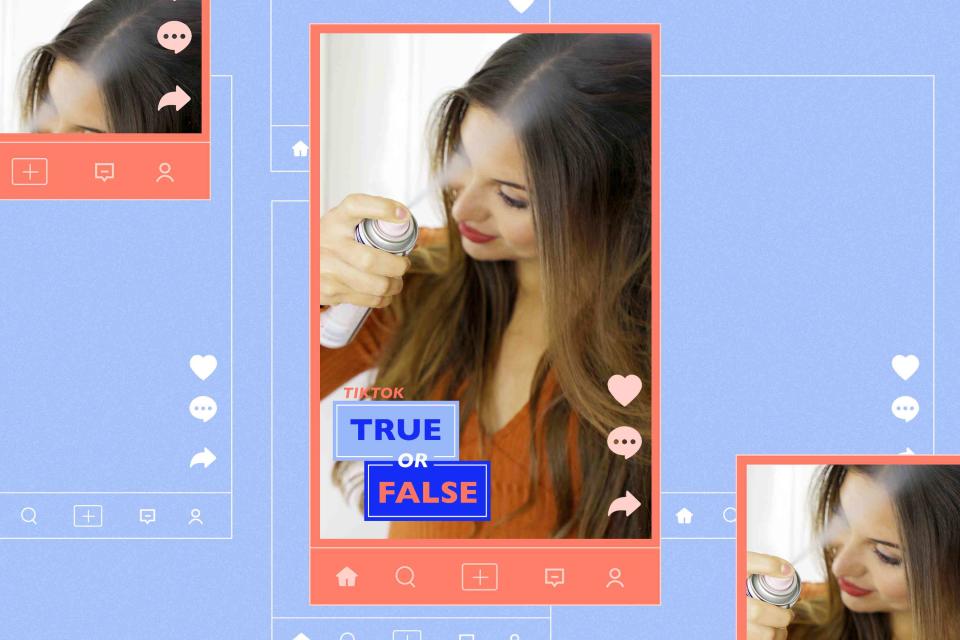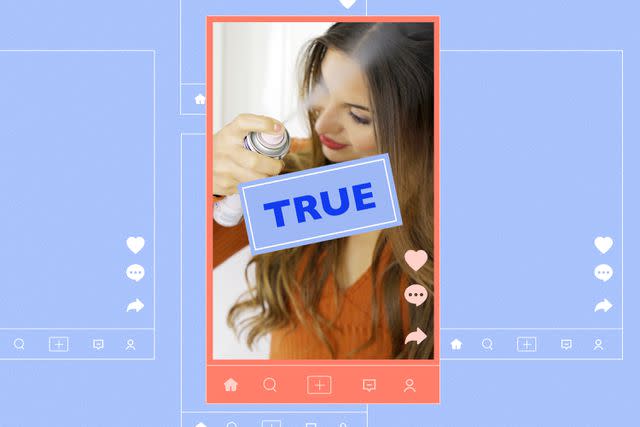TikTokers Are Using Cornstarch As a Dry Shampoo Replacement
Find out if the affordable, natural alternative really works, according to hair-care experts.

TikTok True or False is the answer to your burning questions about the health, beauty, and fitness fads taking over your social feeds. Each story breaks down a buzzy wellness trend with the help of experts and scientific research to uncover the truth and safety behind the viral "advice" you see online. You'll never have to wonder what's actually legit — or what to skip — again.
Dry shampoo can be a major time-saver when it comes to refreshing hair in between actual washes. However, a recent recall of dry shampoo products from popular brands due to benzene, a human carcinogen, may have you reconsidering your go-to spray. If that's the case, it's possible you stumbled upon a hair-care hack gaining steam on TikTok: using cornstarch as dry shampoo.
Yes, instead of heading to Sephora, you can simply grab a tub of cornstarch from your pantry to breathe new life into oily, greasy hair in between shampoos, according to popular videos on TikTok. For instance, user Isabella Traboscia, an aesthetician who goes by the handle @elevenesthetician, shared a clip of her applying cornstarch to her hair roots with a dense makeup brush.
"If you have greasy hair, I'm gonna change your life," she says in the video that currently has more than 1.7 million views. After noting that she's tried all kinds of drugstore and high-end dry shampoo products, she offers cornstarch as a $2 alternative that works better than traditional beauty products, claiming she can go eight days without washing her hair thanks to the pantry essential.
:
A search for "cornstarch dry shampoo" in the app brings up a variety of similar videos, in which users claim cornstarch works as a fantastic dry shampoo alternative that's both cheaper and more natural than traditional options. But does this TikTok trend really work and is it safe? Read on to see what three hair-care experts have to say about whether you can use cornstarch as dry shampoo.
What is dry shampoo?
Dry shampoo is a beauty product that comes in the form of a spray, powder, gel, and foam. Spray aerosol cans of dry shampoo — the popular option at the center of the recent recall — are alcohol- or starch-based, reports the Cleveland Clinic. While dry shampoo doesn't clean the scalp as a true shampoo does, it does absorb grease, sweat, and oil in hair and can add volume.
While it's generally okay to use dry shampoo occasionally in between hair washes, using a lot over time can lead to the build up of dirt and oil on the scalp, which can clog hair follicles, Penny James, a certified trichologist and founder of Penny James Salon, previously told Shape. Dry shampoo can also cause inflammatory scalp concerns, such as seborrheic dermatitis, because it can trap fungus, explained William Gaunitz, a certified trichologist and founder of Advanced Trichology.
Does using cornstarch as dry shampoo work?
ICYDK, cornstarch comes from the endosperm of the corn kernel and is the most commonly used starch. In the kitchen, it can help thicken soups and sauces, but it may also absorb oil, grease, and sweat from the hair and scalp similar to dry shampoo.
“Corn starch is known for its moisture-absorbing properties," says Anabel Kingsley, brand president and consultant trichologist of Philip Kingsley. In fact, cornstarch is found in many dry shampoo product ingredient lists, as it binds to fatty acid chains found in scalp sebum (aka oil), adds Taylor Rose, certified trichologist, IAT.
"It acts similarly to dry shampoo in that it adds volume and thickness to hair, as well as keeping your scalp and hair looking and smelling clean (although it does not actually clean your scalp/hair) without any of the harsh chemicals that are often found in dry shampoos," says Rose.
Best of all, the method will work for all hair textures, confirm the pros. However, those with finer hair and oilier scalps will likely have the most success with using cornstarch as a dry shampoo replacement. "People with finer hair textures will find their hair becomes greasier quicker than any other hair texture because they have many more hairs on their head than any other hair texture," explains Kingsley. "With each of these hair follicles attached to an oil gland, more oil is produced."
:
Although it will absorb excess oil, cornstarch isn't a one-to-one replacement for dry shampoo. "After a day or two of not washing your hair, the sebum secrete on your scalp will collect dead skin cells, dirt, and sweat, which can expel an odor of dirty hair," explains Kingsley. "While cornstarch may absorb the oil, it won’t stop odor being omitted, nor will it include properties to calm or soothe the scalp."
"Cornstarch can leave more residue and leave a texture," adds Michael Dueñas, celebrity hairstylist & founder of Veluer Creative. That's because it's more coarse than traditional dry shampoo made with translucent starch blends. "Store-bought dry shampoo typically contains ingredients to protect your hair from free radicals and other damaging elements," he continues.
Plus, as some TikTok users point out, the cornstarch dry shampoo method can get a little messy, leaving behind white stains on clothing.
Is using cornstarch as dry shampoo safe?
Applying cornstarch to the scalp with a makeup brush instead of using dry shampoo is generally safe, according to hair-care experts. However, there are a few things to keep in mind before trying this TikTok beauty trend.
"A soft bristle brush would create minimal abrasion to the scalp, so [it] wouldn’t be damaging in that respect; however, it can harbor bacteria," explains Kingsley, who recommends avoiding this technique unless you can ensure your brush is completely clean.
:
Additionally, Rose urges people to continue to wash their scalp regularly if they use cornstarch as a dry shampoo replacement. "Although your scalp will look and smell clean from the cornstarch, it's important to remember that it isn't actually clean," she says. "I recommend washing your hair/scalp at least twice a week to allow your follicles to breathe and maintain a healthy scalp environment.”
Dueñas also points out the potential for buildup caused by applying cornstarch to the scalp with a makeup brush, but notes that the practice itself isn't dangerous. "It would be extremely rare to have a reaction to it," he says.
You can use cornstarch as a dry shampoo replacement: True or false?

While it's no alternative to regular shampooing, applying cornstarch directly to the scalp or with a clean makeup brush is a relatively safe and effective way to freshen up hair in between washes.
Additionally, regular shampooing is "the best alternative to dry shampoo" to ensure a clean scalp and strands, according to Kingsley. You can also seek out dry shampoo products with natural ingredients if this DIY hack isn't for you. As always, chat with a professional if you have specific hair or scalp concerns before trying anything new.

